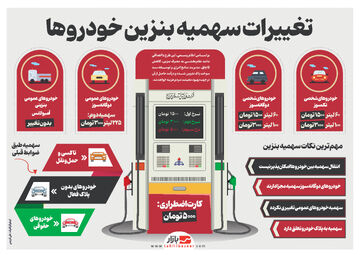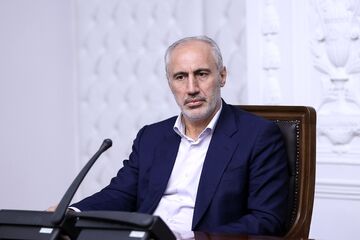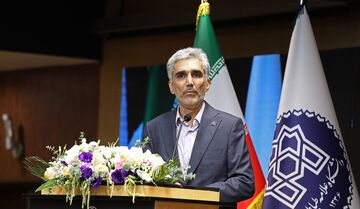Tehran(Bazaar): Zangezur Corridor is not a threat, but a challenge which will require Iran to flexibly adapt its regional geo-economic vision, Andrew Korybko tells Bazaar in an exclusive interview.
Nothing that Iran's 3+3 plan perfectly aligns with Azerbaijan's proposed six-nation regional integration platform, Russia's Greater Eurasian Partnership (GEP), and China's Belt & Road Initiative (BRI), he also says that All of the countries in this 3+3 plan, are in favor of integration, regionalization, and Eurasian connectivity.
Korybko is an author, senior, journalist and faculty member at the Institute for Strategic and Futuristic Studies at the Russian Friendship University. A Moscow-based American political analyst specializing in the relationship between the US strategy in Afro-Eurasia, China's Belt & Road Initiative, and Hybrid Warfare.
Following is the text of the interview:
Bazaar: Given the issue of Iran being placed on the plans of the Baku government in the Zangezur Corridor, what is the approach of Turkey, Russia and Armenia to this issue? Is Iran allowed to do this work?
Korybko: Russia and Turkey support the unblocking of all regional economic and transport links, including those “between the western regions of the Republic of Azerbaijan and the Nakhichevan Autonomous Republic” that were specifically stipulated by the Moscow-mediated ceasefire agreement from November 2020 which Azerbaijan regards as the Zangezur Corridor.
Armenia, however, disputes this terminology because it fears that it implies territorial claims to its Syunik Province through which the proposed corridor will transit. Yerevan's fears are unfounded, however, since the same ceasefire agreement also mandates that “control over transport communication is exercised by the Border Guard Service bodies of the FSS of Russia.” Since Russia and Armenia are mutual defense allies through the Moscow-led Collective Security Treaty Organization (CSTO), it's unrealistic to expect it not to defend its South Caucasus partner in the event of any aggression from Azerbaijan and/or Turkey, especially over the Zangezur Corridor/Syunik Province.
Armenia's concerns are therefore most likely intended for domestic and international political reasons. Regarding the first, its government wants to continue appealing to nationalists in order to defend itself from accusations that it “sold out” the country's interests late last year. As for the second dimension, Armenia hopes to attract other countries' attention, especially Western European ones like France, so that it can then play them off against Russia in order to ideally reap the best benefits from both. This is a very irresponsible policy.
Bazaar: The 3+3 Iranian plan which means the presence and cooperation between Iran, Turkey and Russia, plus the three countries of the South Caucasus, including Georgia, the Republic of Azerbaijan and Armenia. In this case, the plan is also a kind of aid to Russia's Eurasian plan, and includes the countries of Central Asia and the Caucasus, which is a kind of competitor to China's One Belt-One Road. What's your opinion ?
Korybko: Iran's 3+3 plan perfectly aligns with Azerbaijan's proposed six-nation regional integration platform, Russia's Greater Eurasian Partnership (GEP), and China's Belt & Road Initiative (BRI). Their shared vision is to more closely connect neighboring countries in order to create a larger economic region that can then play a greater role in Eurasia's evolving geo-economic scenarios. They're complementary and not competitive. All of these countries are in favor of integration, regionalization, and Eurasian connectivity.
Bazzar: Is the Zangezur Corridor a threat to Iran's interests in the Caucasus?
Korybko: It's not a threat, but a challenge which will require Iran to flexibly adapt its regional geo-economic vision. Prior to last year's conflict, “mainland” Azerbaijan's connectivity with Nakhchivan was facilitated through northern Iran since Baku couldn't transit through Armenian-occupied Karabakh. The Zangezur Corridor will reduce Azerbaijan's transit dependence on Iran and perhaps outright eliminate it with time. This will necessitate Iran reimagining its regional economic role and making more proactive economic outreaches to the Caucasus.
Bazaar: Following the Russian-brokered ceasefire between the Republic of Azerbaijan and Armenia, Russian commentators announced that Moscow had allowed Turkey to play a key international role in the South Caucasus. What makes the Nagorno-Karabakh agreement dangerous for Russia is the possibility of "losing the Caucasus and even more." Russia no longer has an ally, not even a hypothetical ally. What is your opinion?
I very strongly disagree with the entirety of that assessment. Turkey wasn't party to November's Russian-mediated ceasefire agreement but struck its own separate bilateral pact with Azerbaijan immediately afterwards in order to deploy its troops there to monitor the ceasefire. Russia therefore didn't “allow” Turkey to do anything since Ankara and Baku did this on their own as is their sovereign right, though Russia flexibly adapted to this easily foreseeable scenario and pragmatically decided to cooperate with Turkey.
Turkish influence had been growing in the South Caucasus even before last year's conflict but it became officially institutionalized with this summer's Shusha Declaration which comprehensively strengthened its alliance with Azerbaijan. The overall trend in this region of the post-Soviet space as well as others is that Russia is being compelled by global geostrategic circumstances largely beyond its control to transition its leadership model from one of so-called “monopolization” to “accommodation”.
What's meant by this isn't that Russia consciously seeks to “monopolize” its partners' affairs and thus retain practically full control over regional developments in defense of its national interests as it understands them to be, but just that some observers can nevertheless describe its unintended outcome in such a way, however provocative it may be. This model is increasingly becoming outdated with the worldwide transition to multipolarity, ergo its gradual transformation towards “accommodation”.
This takes the form of pragmatically “accommodating” Turkey in the South Caucasus, China in Central Asia, etc., though only on the condition that they don't harm Russian interests. That's why Russia is so strongly against NATO's eastern expansion towards its western borders since this military bloc openly regards Moscow as its enemy, unlike Ankara and Beijing. Still, some in Russia are concerned about Turkey's long-term strategic motives, though they seem to regard its potentially latent challenge as manageable for the time being. In response to the remark about Russia not having any regional allies left, that's a factually incorrect assessment since Armenia still remains a member of the Moscow-led CSTO mutual defense pact.
In addition, just because Azerbaijan isn't part of that structure and therefore isn't officially an ally doesn't mean that it's a rival or worse. In fact, bilateral relations have never been better, and it's all because of Russia's pragmatic stance towards last year's conflict in refusing to overtly support one side over the year. Russia is also in favor of Azerbaijan's proposed six-nation regional integration platform which aligns with Moscow's Greater Eurasian Partnership.
Upon its successful implementation, it'll facilitate Russia's connectivity with the South Caucasus countries as well as the region's neighboring Iranian and Turkish Great Powers. The strengthening of complex economic interdependence between all of them will at least theoretically reduce the risks of any actor behaving unilaterally since the resultant destabilization could harm its own interests.
Bazaar: One of the contracts and corridors that can be proposed in relation to Zangezur is the North-South Transport Corridor (NSTC). Is the position of the NSTC and Iran's participation in this corridor endangered?
Korybko: No, the Zangezur Corridor and NSTC are complementary integration projects. The first-mentioned will facilitate East-West trade while the second will do the same for North-South trade. Together, they'll help to more closely integrate the South Caucasus and the neighboring Great Powers surrounding this region, which advances their collective strategic interests. Iran's priority should be to concentrate its NSTC-related activities on strengthening its integration with the South Caucasus as opposed to focusing more on its broader goal of facilitating Russian-Indian trade. That's because India's support of the US' unilateral sanctions greatly impeded the implementation of this project's initial vision. Tehran must therefore focus more on those countries that aren't afraid to trade with it.
With time, however, Iran can reconsider reviving the NSTC's initial purpose of facilitating Eastern European-South Asian trade. That might occur sooner than expected and even see Pakistan replace India as the eastern anchor state of this vision if Iranian Consul to Pakistan Mohammed Reza Nazeri's comments from mid-July are any indication. Pakistan's Express Tribune reported that he told an audience at the first session of the Pakistan-Iran Business Facilitation meeting that they could explore the potential of transit trade with Russia among other opportunities that his geostrategically position country presents for them.
This is a viable alternative to India since Russian-Pakistani ties are rapidly improving in parallel with Iran's ones with those two's Chinese partner. March's 25-year Chinese-Iranian Strategic Partnership agreement will prospectively see the People's Republic invest more in the Islamic Republic's infrastructure with time. This could result in China replacing India's originally envisioned role in the NSTC. The outcome could be that Iran serves as a bridge between Russia and Pakistan instead of Russia and India, though Russia could still utilize the NSTC to trade with India too if it wants. For the time being, however, such ambitious plans are probably a far way's off.
It's therefore better for Iran to concentrate on expanding the NSTC's South Caucasus connectivity in order to strengthen complex economic independence between itself and the five relevant countries. Success on this front could generate even more interest among those countries for the NSTC's broader goal of facilitating their trade with South Asia.
















نظر شما